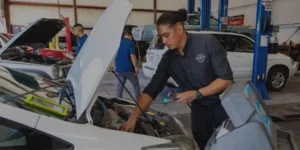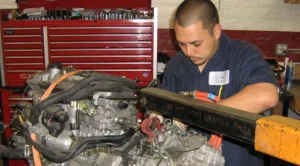As hybrid vehicles continue gaining recognition on roads worldwide, more drivers are exploring how to maintain them efficiently and safeguard their performance. Hybrid cars combine an internal-combustion engine with an electric motor and battery system, which means their maintenance needs differ in some ways from traditional gasoline models. For a business like Osborn Automotive, this presents both opportunity and responsibility: helping owners understand the unique service demands, and equipping them for reliable performance.
Why Hybrid Vehicles Are Growing
Hybrid vehicles are gaining traction for several reasons:
-
Improved fuel efficiency — drivers often see better miles-per-gallon because the electric motor assists the gasoline engine, especially in city driving.
-
Lower emissions — by using electric assist and regenerative braking, hybrids contribute less tailpipe output.
-
Broadening model availability — many major automakers now offer hybrid variants, making choices easier for buyers.
-
Consumer mindset shift — owners are more aware of environmental impacts and long-term operational savings.
Industry-wide, there is strong coverage of how automotive technology is shifting toward electrification, including hybrids and fully electric models.
For a service centre, this means adapting to new systems, training staff, and updating diagnostic tools.
Key Maintenance Elements Unique To Hybrids
Maintaining a hybrid vehicle involves some conventional maintenance tasks, plus several additional considerations:

-
Battery health and cooling systems
The hybrid battery pack is a critical component. While many packs are designed to last the usable life of the vehicle, factors like heat, charging habits, and driving conditions can influence its longevity. Owners should monitor battery cooling systems, keep vents clear, and ensure any hybrid-specific warnings are addressed promptly. -
Regenerative braking system and brake wear
Regenerative braking allows the vehicle to recapture energy when slowing, reducing conventional brake usage. That often means less brake pad wear, but it also means service technicians need to inspect the system (electronics, hardware) to ensure proper function. It’s still wise to check brake fluid, calipers, and related hardware. -
Engine and transmission maintenance
Even though the electric motor assists, the gasoline engine still requires oil changes, filter replacements, spark-plug inspections, and other standard maintenance. Some hybrids also use a continuously variable transmission (CVT) or e-CVT which demands specific fluid types and service intervals. -
Cooling systems and inverters
The power-electronics (inverter/converter) also generate heat. Cooling systems specific to hybrid components must be monitored and serviced (coolant levels, leaks, fan operation). Failure in these subsystems can lead to battery overheating or degraded performance. -
Software updates and diagnostics
Hybrids are more software-intensive than traditional vehicles. Diagnostic scanning and firmware updates are becoming more common, so repair shops must maintain up-to-date equipment and training.
Practical Tips For Owners
For vehicle owners, staying proactive helps keep hybrids running smoothly.

-
Follow the manufacturer’s hybrid-specific service schedule. Many drivers assume “less engine usage” means less maintenance, but that may lead to neglect of key systems.
-
Keep the cooling vents and fans for the hybrid system clear; parking away from direct sunlight and avoiding heavy loads when hot helps battery longevity.
-
Monitor for dashboard warning lights or reduced fuel-efficiency signs—these may indicate hybrid-system issues rather than just the gasoline engine.
-
Even though brake wear may be reduced, still schedule periodic inspections—brake fluid absorbs moisture over time and the brake system needs attention.
-
Choose a repair shop well-equipped for hybrids—including technicians trained in high-voltage systems and shops with proper tooling.
At Osborn Automotive, recommending a hybrid-system check as part of an annual service helps clients stay ahead of issues. This could be linked to an internal blog post, such as “How to Know If Your Battery Is Dying” on your blog.
Why This Matters For A Service Business
For a repair facility, hybrids represent a growth area. As more drivers adopt them, staying current with hybrid-maintenance best practice positions you as a trusted resource. This means: training staff, investing in hybrid-capable diagnostic equipment, and educating customers on what “normal” looks like. Many standard repair shops may still be catching up, so being ahead offers a competitive advantage.
Moreover, implementing a “hybrid check” as part of service packages helps build reliability and repeat business. As noted in industry commentary, the automotive service and aftermarket sector is shifting toward “connected and customized” services.
Potential Pitfalls and How To Avoid Them
While hybrids offer benefits, there are some pitfalls to watch out for:
-
Owners delaying service thinking “electric motor handles everything” can lead to more costly repairs later.
-
Some technicians unfamiliar with high-voltage systems may perform inappropriate service—ensure certified handling.
-
Battery packs may degrade if subjected to constant high-heat environments, lack of coolant maintenance, or heavy repetitive load cycles.
-
Aftermarket or “generic” parts may not be designed for hybrid-specific components—select quality, correct parts.
For more insights, explore our comprehensive articles on Why Your Key Fob or Car’s Built-In Remote Sometimes Fails to Open the Garage, Understanding Your Car’s Transmission: What You Need to Know, and Why Regular Oil Changes Are Crucial for Your Vehicle’s Health.
Explore additional resources on “Is the automotive industry facing another chip crisis?” via AutoTechInsight, Latest automotive market trends via Auto Business Outlook, “News & Insights” from Messe Frankfurt’s automotive site, General auto news feed via NewsNow, and CarBuzz current news stream.
Conclusion
The growth of hybrid vehicles means more drivers will seek trustworthy maintenance and reliable service. By focusing on hybrid vehicle maintenance—covering battery health, cooling, regenerative brakes, engine systems, and software updates—Osborn Automotive stands to support an expanding customer base and demonstrate leadership in servicing modern vehicles. Encouraging owners to commit to service schedules, choose trained technicians, and keep key systems monitored helps protect their investment and extends vehicle life.
